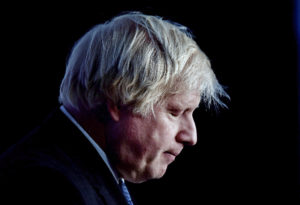I suppose, if you really wanted to stretch a point, Marie Antoinette’s proposal to “let them eat cake” could be cast as an early expression of the whole levelling up agenda. After all, that famous phrase could be twisted to mean “cake for all” — not, of course, that the revolutionaries would have been in the slightest bit convinced.
They would have recognised that the rhetoric of levelling up can all too easily be conscripted as a clever alibi for the maintenance of the status quo. It implies that those of us who are wealthy do not need to change our ways, that others can aspire to our level, that levelling up for some will not mean levelling down for others. Levelling up doesn’t frighten the rich. It implies that no one is going to take their precious cake away.
Of course, cake is the very last thing that the Prime Minister wants us to be thinking about now. Not only because it has become a symbol of the “one rule for us, another for them” thinking that has come to characterise his premiership. But also because he has ostentatiously broken the golden rule of class camouflage. As Keynes put it: “the capitalist classes were allowed to call the best part of the cake theirs and were theoretically free to consume it, on the tacit underlying condition that they consumed very little of it in practice.” Boris, meanwhile, has his cheeks stuffed full and has crumbs all down his shirt.
So, desperate to avoid all mention of cake, Boris is off to Scotland for the half-term break to promote his levelling up agenda. It’s the great Boris rebranding exercise, a tour of less-well-off places that will benefit from his big plan. That is what we are supposed to think, anyway. It turns out that many of the places that have been awarded early levelling up funds are Tory-run areas that are relatively prosperous. Savid Javid’s constituency of Bromsgrove is set to receive £14.5 million and Nadine Dorries’s neck of the woods of Bedfordshire £26.7 million. Both of these areas are in the least deprived fifth of local authorities in the UK.
Economists like cake too, of course. Some think the important thing is that it is divided up equally. Others that it needs to be grown, with everyone getting a bigger piece even if that means some still get more than others. The Prime Minister — like pretty much all-mainstream political parties, with the possible exception of the Greens — is of this latter view. If the size of the cake remains the same, more for the poor will mean less for the rich. But if we grow the cake, we can support the poor without bothering the rich. One of these options is electoral kryptonite, the other is electoral gold.
There is a reason the Greens are the most sceptical about growth. As David Attenborough put it in his latest book: “Our first lesson from nature concerns growth. We have arrived at this moment of desperation as a result of our desire for perpetual growth in the world economy. But in a finite world, nothing can increase forever.” In other words, at some point the cake doesn’t get any bigger. Or rather, it gets bigger at the expense of the health of the planet. We all watch his lovely TV programmes, we ooh and aah at the cute images, we have a bit of a cry, we think of him as a national treasure. But we totally ignore the punchline.
The trouble with the growth is that is has been historically very bad at pricing in all the consequences of our comfortable lifestyles — things like carbon emission and nuclear waste. And if those, like Attenborough, who predict disaster are even half right, then the challenge for the foreseeable future will not be how to level up but how most of us can learn to level down. Levelling up is a luxury we can no longer afford.
No doubt the Tories will point to the fact that the levelling up agenda includes “£26 billion of public capital investment for the green industrial revolution and a transition to New Zero”. Which is another way of saying that the best way to get to less carbon is more and better capitalism, appropriately directed, supported by more and better technology. More gives us less. Of course we should be suspicious.
Tories will also say that Attenborough’s thought is dangerously watermelon-like: green on the outside, red in the middle. Some years ago, the philosopher Derek Parfit gave what is often said to be the decisive argument against egalitarianism: “Suppose that those who are better off suffer some misfortune, so that they become as badly off as everyone else. Since these events would remove the inequality, they must be in one way welcome… even though they would be worse off for some people, and better for no one. This implication seems to many to be quite absurd. I call this the Levelling Down Objection.” Equality, of the sort loved by the Left, makes no sense if it addresses the question of blindness by putting out everyone else’s eyes — so goes the Parfit objection to the levelling down agenda.
But this only works if we are sure that levelling up genuinely means aspiring to something better. Parfit’s levelling down criticism is an objection to equality as an end in itself. But the argument being put forward by radical Greens isn’t about equality; it’s that some version of levelling down — of the wealthy, even the moderately wealthy, having less, producing less, consuming less — is what we need to achieve in order for us to save the planet from catastrophe.
If Boris’s levelling up agenda is little more than a pork-barrel electoral ploy targeted at floating voters, and one that leaves a dangerous economic complacency intact, then “up” isn’t better, but just another meaningless metaphor — like growth itself — that reinforces our refusal to face what we are doing to the planet. If Attenborough is right, growth is killing us. So “up” isn’t always good. And we need more politicians brave enough to say it: we need to be talking more about levelling down as an aim, not as something to avoid.
Yes, there are very many people who do require a lot more economic support — some of whom live in this country, but most of whom don’t. The reduction of that tiny sliver of cake that this country used to give to the poorest in the world in foreign aid — from 0.7% of GDP to 0.5% — is an indication that Johnson doesn’t really give two hoots about levelling up the poorest in the world. So don’t be deceived: his levelling up agenda is just a smidgeon of Left-leaning cosplay to tickle up a few Red Wall voters. We should learn to despise this grinning cynicism.
Yet the proponents of levelling down still feel like grumpy Old Testament prophets, mad Green voices of doom crying in the wilderness. They are telling us something we do not want to hear. Something no one would ever vote for. I suppose Christianity has had a hand in associating “up” with something good and better and “down” with something bad. Up is towards heaven, down is towards the fiery pit and everlasting damnation. But these days, we are being led into fire by the language of more and of up.
Disclaimer
Some of the posts we share are controversial and we do not necessarily agree with them in the whole extend. Sometimes we agree with the content or part of it but we do not agree with the narration or language. Nevertheless we find them somehow interesting, valuable and/or informative or we share them, because we strongly believe in freedom of speech, free press and journalism. We strongly encourage you to have a critical approach to all the content, do your own research and analysis to build your own opinion.
We would be glad to have your feedback.
Source: UnHerd Read the original article here: https://unherd.com



